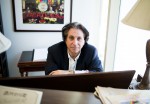Richard Danielpour began his music residency at an isolated retreat for composers the day before 9/11.
On the second day of his residency, the UCLA composition professor called his music editor’s office in downtown New York to find out how long he had to finish editing his latest piece, “An American Requiem.” He was met with screams on the other end of the line and spent the next 40 minutes listening to a woman from his music editor’s office telling him about the plane that had flown over her head and crashed into the World Trade Center.
Danielpour drew from the experience to finish the piece “Songs of Solitude,” pairing his orchestral music with W.B. Yeats’ poetry. The composition, which premiered with The Philadelphia Orchestra in 2004, has been nominated for Best Contemporary Classical Composition at the 60th Annual Grammy Awards. Danielpour’s album “Songs of Solitude & War Songs,” released in 2016, is also up for Best Engineered Album in the classical category.
“‘Songs of Solitude’ really has to do with this issue of how do you deal with the idea of being attacked,” Danielpour said.
The retreat, based in the late famous composer Aaron Copland’s house, hosts one composer at a time to help them focus on their work while immersed in the historical dwelling. Danielpour said many of Copland’s scores and books are still there, mentioning that in a few books, Copland had slipped personal newspaper articles between the pages.
“There was just an incredible feeling of quietude,” Danielpour said.
However, when Danielpour turned on the TV just in time to see one of the twin towers collapse, he said the sense of isolation was overwhelming, which made him think obsessively about the horrific event.
“I went into the city a couple of times and I smelled the smell of the burning bodies, which was just something I’ll never forget,” Danielpour said. “I’m really very glad I wasn’t there when it happened, because a lot of the people that I know like myself have asthma and respiratory issues said it was impossible to breathe for two weeks afterward – the air was so thick and toxic.”
Danielpour chose to incorporate Yeats’ poetry into “Songs of Solitude” because he felt it related thematically to his emotions after the catastrophic event. Danielpour said Yeats’ experience with the Irish Civil War was similar to the state of America after 9/11, so his poetry conveyed the postapocalyptic tone he wanted to express in “Songs of Solitude.”
“(The Irish Civil War was) the end of the world as they knew it, and this was almost 100 years later that we also understood that the world would never be the same after 9/11,” Danielpour said.
Danielpour’s other piece “War Songs,” which is featured alongside “Songs of Solitude” on the Grammy-nominated album, was originally written for the piano, but The Nashville Symphony commissioned him to create an orchestral version of the piece. Danielpour used pictures of fallen soldiers from the Iraq War as a source of inspiration and sections of Walt Whitman’s poem “Leaves of Grass” for the lyrics.
Danielpour is no stranger to Grammy nominations and has fulfilled 124 commissions in his 37 years in New York. In 1997, he was nominated for Best Classical Contemporary Composition for his “Concerto for Orchestra.” In the same year, Yo-Yo Ma won two Grammys for Best Classical Album and Best Instrumental Soloist(s) Performance (With Orchestra) with the recorded album “Cello Concertos,” which featured Danielpour’s works.
Peter Kazaras, music professor and director of opera at UCLA, said he was thrilled when he heard about Danielpour’s Grammy nominations. Though Danielpour has only written one opera, Kazaras said his vocal pieces feature a narrative quality, despite the absence of a discernible plotline.
“It’s great that he’s here and it’s great that he has the Grammy nomination,” Kazaras said. “It adds to the general luster of what’s going on at the school and it’s exciting.”
Ian Krouse, a composition and theory professor at UCLA, first invited Danielpour as a guest faculty member five years ago. As a voting member of the Grammys, Krouse said he was unsurprised by Danielpour’s nomination.
“They represent, I think, his finest work,” Krouse said. “(Danielpour) is particularly gifted in writing for the voice.”
Now a professor and one of the newest additions to UCLA’s composition department in the Herb Alpert School of Music, Danielpour said he does not expect to win at the Grammys, but appreciates the recognition from his peers that comes with the nomination.
“Winning or not winning is not really the point,” Danielpour said. “The point is to just be acknowledged for the work … and to me, it’s nice to know that somebody’s listening.”
